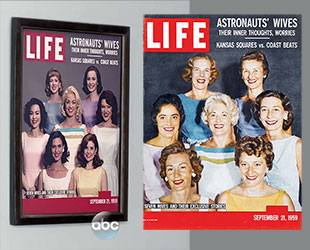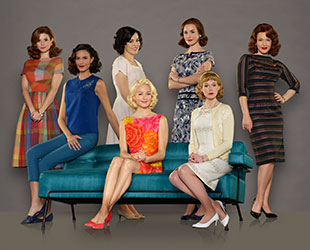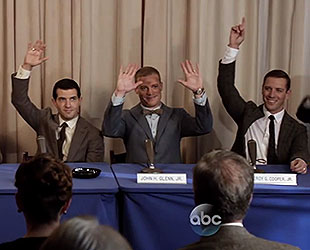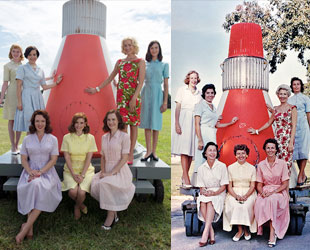 advertisements advertisements
|

|
'The Astronaut Wives Club' post-'Launch' review: space history vs. Hollywood

"The Astronaut Wives Club" recreated LIFE magazine's Sept. 21, 1959 cover featuring the Mercury astronauts' wives. (ABC/LIFE) |
June 19, 2015 — "The Astronaut Wives Club," ABC's new drama about the women behind America's first spacemen, has left the launch pad.
The premiere of the 10 episode "limited series," aptly titled "Launch," debuted Thursday (June 18), almost two years after the network announced it was adapting Lily Koppel's 2013 book about the "Astro Wives" for the small screen.
Spanning two years over the course of the hour, the first episode followed the selection of NASA's original Mercury 7 astronauts in 1959 through the launch of Alan Shepard (played here by Desmond Harrington) to become the first U.S. astronaut to fly in space in May 1961. Along the way, viewers were introduced to the "bunch of housewives" who were thrown into the spotlight by LIFE magazine.
"The Mercury Seven were a unique group of women and you sort of have to jump onboard with them as they get to know one another while their newly-picked husbands get to know each other socially at parties and memorably at the wives' first photo shoot with LIFE magazine," reflected Koppel in an interview with collectSPACE.

The cast of ABC's docu-drama "The Astronaut Wives Club" (ABC) |
As the wives meet each other, so do the viewers, as the show introduces Betty Grissom (JoAnna Garcia Swisher), Marge Slayton (Erin Cummings), Rene Carpenter (Yvonne Strahovski), Annie Glenn (Azure Parsons), Trudy Cooper (Odette Annable) and Jo Schirra (Zoe Boyle).
Central to "Launch" though, is Louise Shepard, portrayed by Dominique McElligott, as the wife of the United States' first man in space.
"Episode one really focuses on Louise, who was perfectly cast," Koppel said. "She was a lady through and through — what all the real-life Astro Wives told me when I visited them in their homes spread across the country."
"She has her challenges and faith, and I believe the right stuff which often meant sticking by your astronaut despite the hard position of dealing with his fame and swagger," described Koppel, who is credited as a consultant for the series and joined the cast and creators in Los Angeles on Thursday to watch the premiere.
The episode recreated some scenes straight out of space history, for example the press conference that announced Shepard, Gus Grissom (Joel Johnstone), Scott Carpenter (Wilson Bethel), John Glenn (Sam Reid), Gordon Cooper (Bret Harrison), Wally Schirra (Aaron McCusker) and Deke Slayton (Kenneth Mitchell) to the country, as well as the covers of LIFE that featured both the astronauts and their wives.

In a scene straight from space history, hands raised for who will be first to launch on ABC's "The Astronaut Wives Club." (ABC) |
The scenes of Redstone and Atlas rocket launches were a mix of archival footage and computer animations.
The episode, and "The Astronaut Wives Club" in general, does take some liberties with the events that involved the wives, in part because their experiences were not as well documented in the day as their husbands' space exploits. The result is what some have described as a "soap opera quality" to the show.
"It is a drama, of course, but in a way the wives' story had some soap opera aspects," Koppel said.
The episode ends with Betty Grissom learning that Gus, her husband, will be the next to launch, setting up the next week's episode, "Protocol," airing on Thursday, June 25.
Post-mission debriefing: Here is a look at where "Launch" was faithful to space history ("A-OK!") and where it veered off course ("ABORT!").
"NASA called" Early in the episode, Louise shows up at her husband's Navy office and informed him that Mr. Donlan from NASA called.
ABORT! Charles Donlan, assistant director of the Space Task Group, did indeed call Alan Shepard to confirm he still wanted to be a Mercury astronaut, but according to his biographer Neal Thompson, it was Louise who couldn't be reached.
"Alone in his office, Shepard let out a whoop and then called Louise," wrote Thompson (in "Light This Candle"). "When he could not reach her, he quit for the day and raced home..."
Company men: In addition to the astronaut wives and their husbands, the two other key characters in "Launch" are NASA PR flack Duncan Porter (Evan Handler) and LIFE magazine journalist Max Kaplan (Luke Kirby).
ABORT! Both men are fictional, though based on one or more real-life people. Porter is closest in role (and name) to NASA public affairs officer John A. "Shorty" Powers, who was known as the "voice of the astronauts." Powers controlled press access to the men and had to approve what LIFE magazine's reporters wrote about the wives.
Kaplan represents several LIFE reporters, including Loudon Wainwright.
Two hands up: In the show's restaging of the 1959 press conference, the newly-named astronauts all raise their hand to the mention of who would be first in orbit — all but Glenn, that is, who raises both his hands.
A-OK! Though it was in reply to a reporter and not NASA administrator Keith Glennan's introduction as shown, Glenn did indeed raise both his hands when they were asked, "Who wants to be the first man launched into space?" (Schirra also raised both.)
"Just doing my job." At their first LIFE magazine photo shoot, the wives show up to pose around a mockup of a Mercury capsule. All the women show up in pastel color dresses, except Rene Carpenter, who is sporting a bold rose patterned sundress.
A-OK! The show's version of this photo op, as well as the group photo that landed on the cover of LIFE is near spot-on to how the astronaut wives posed.
"The first shoot for LIFE is perfectly rendered," said Koppel. "As in the book and real life, they look like they're selling a Maytag. It is the first step on their Cinderella transformation into American royalty and I believe our country's first reality stars."
(One note, though, about the show's Rene, Yvonne Strahovski: Though she has the blond hair for the part, she's a tad taller than her subject. Strahovski stands 5 feet, 9 inches, whereas Rene is about half a foot shorter.)

The real astronaut wives' first LIFE photo shoot was recreated for the premiere of ABC's "The Astronaut Wives Club." (ABC/LIFE) |
"All engines running" The wives stand along the beach to watch the first test flight of an unmanned Mercury capsule. Moments into flight, it explodes, leaving them worried for their husbands.
A-OK! ...and ABORT! According to Koppel's book, the wives were indeed standing on Cocoa Beach at 9:13 a.m. on July 29, 1960, when Mercury-Atlas 1 lifted off. About a minute later, the vehicle suffered a structural failure and was lost.
But it had been raining earlier that day and when the Atlas launched, it quickly entered a cloud deck and flew out of sight. None of the spectators — the astronauts' wives included — saw it explode.
(The show also invents a countdown for this launch that includes callouts such as "all engines running" that were more appropriate for a later Apollo Saturn launch. The countdown though could be considered an unintended tribute to Jack King, the "voice of launch control," who famously delivered that phrase during the Apollo 11 liftoff, and who died June 11.)
"Respect my privacy." Louise Shepard turns away the other six wives, preferring to be alone with her daughters (and reporter Kaplan) when her husband launches for space.
A-OK! Both Thompson and Koppel describe Louise watching Alan lift off aboard Freedom 7 without the company of the wives. Only her daughters, parents and a reporter and photographer were present.
There does not however, seem to be an account of Louise rejecting "a little human kindness," as Trudy Cooper laments in the show.
"Freedom 7, Capcom, do you read?" As Shepard plunges back into the atmosphere, Mission Control loses radio communication with him and there are a few tense moments where it's unclear if he is "OK."
ABORT! Perhaps evoking a similar scene from the film "Apollo 13" for dramatic effect, there wasn't an extended period where Shepard fell out of contact with the ground. During his descent, as the force of gravity built up, he radioed, "OK, OK, OK" until the pressure against his body subsided.
Shorty Powers relayed Shepard's "OK" calls to the press. "Going through big 'g' now, he is still talking, saying "OK."
It was not until after the capsule's main parachute had deployed that Powers reported, as expected, "our communication... is getting a little rough," but by then, Shepard was safely on his way to landing.
"We are going to the moon..." After meeting with President Kennedy at the White House, Louise and Alan Shepard discuss the future. Louise is relieved they can now "take a step back, just breath...," to which Shepard replies there's "no breathing" as "we are going to the moon."
A-OK! On May 25, 1961, only 20 days after Alan Shepard's historic space flight, Kennedy addressed a special joint session of Congress and proclaimed, "...this nation should commit itself to achieving the goal, before this decade is out, of landing a man on the moon and returning him safely to Earth."
"The Astronaut Wives Club" collectSPACE reviews:
Episode 1 - "Launch" (June 18) -
-
-
-
-
-
-
-
|

© 1999-2025 collectSPACE. All rights reserved.

|
|

|

|
